牛津译林版九年级英语上册 Unit3 Teenage problems Period 4Integratedskills & Studyskills课件(共48张PPT)
文档属性
| 名称 | 牛津译林版九年级英语上册 Unit3 Teenage problems Period 4Integratedskills & Studyskills课件(共48张PPT) |
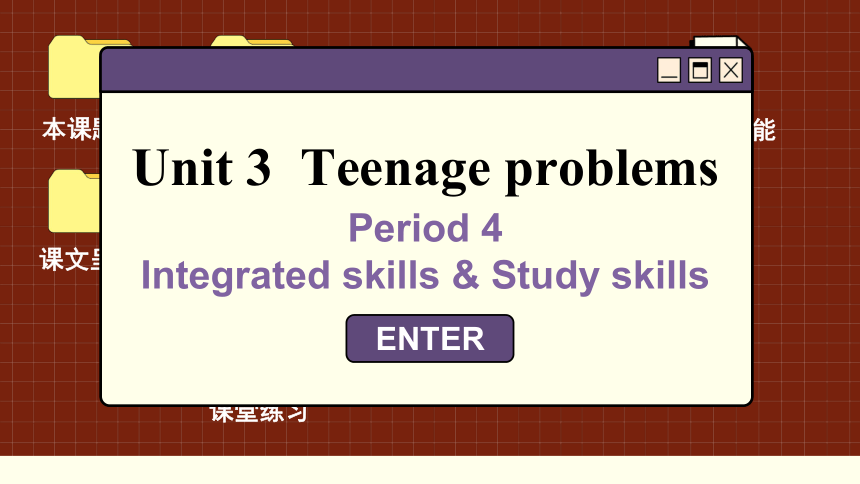
|
|
| 格式 | pptx | ||
| 文件大小 | 1.4MB | ||
| 资源类型 | 教案 | ||
| 版本资源 | 牛津译林版 | ||
| 科目 | 英语 | ||
| 更新时间 | 2024-08-13 13:55:24 | ||
图片预览

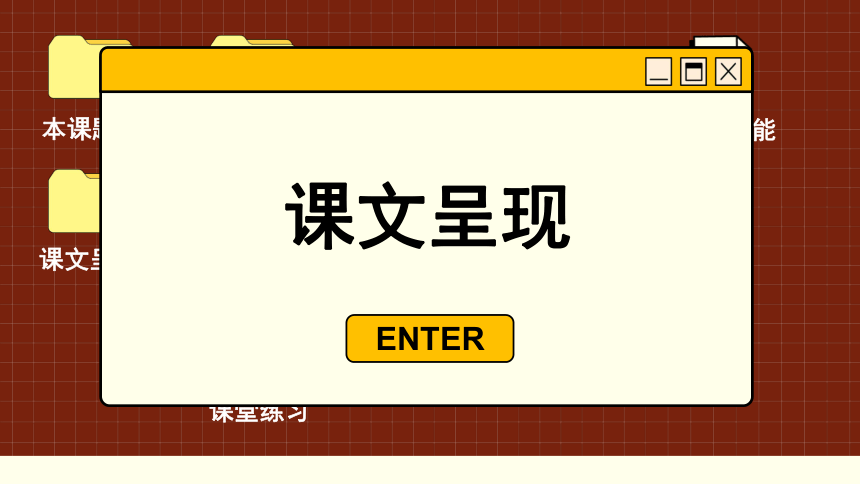

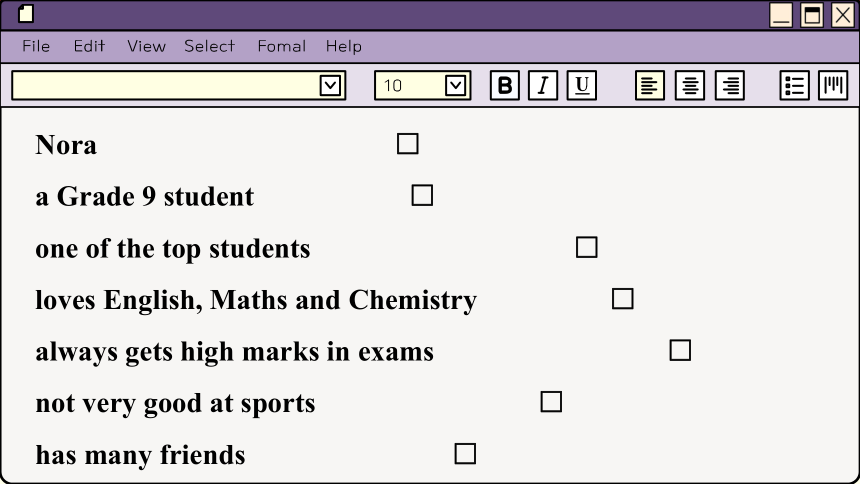
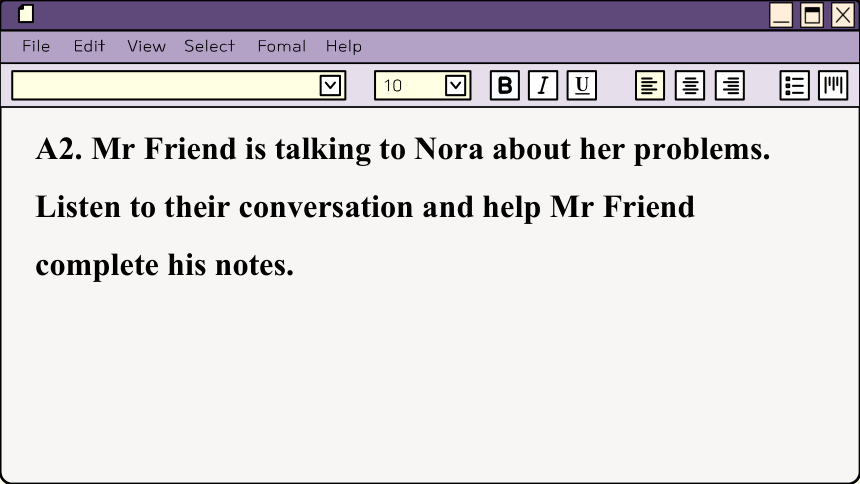
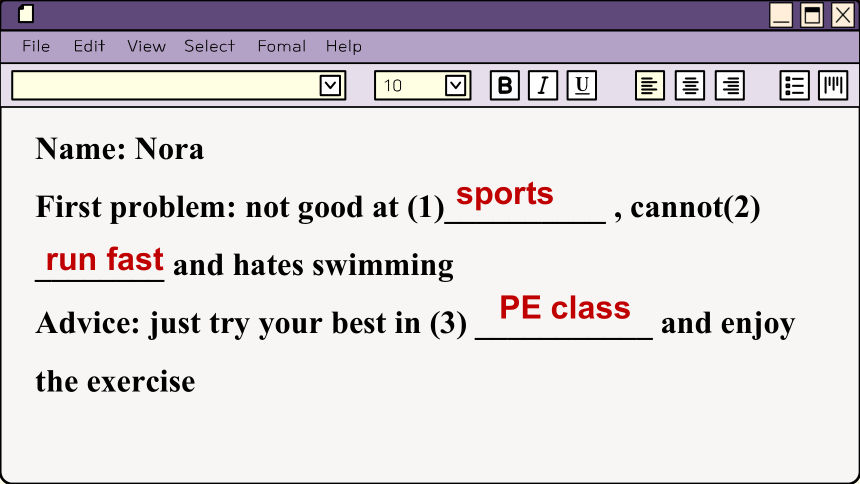
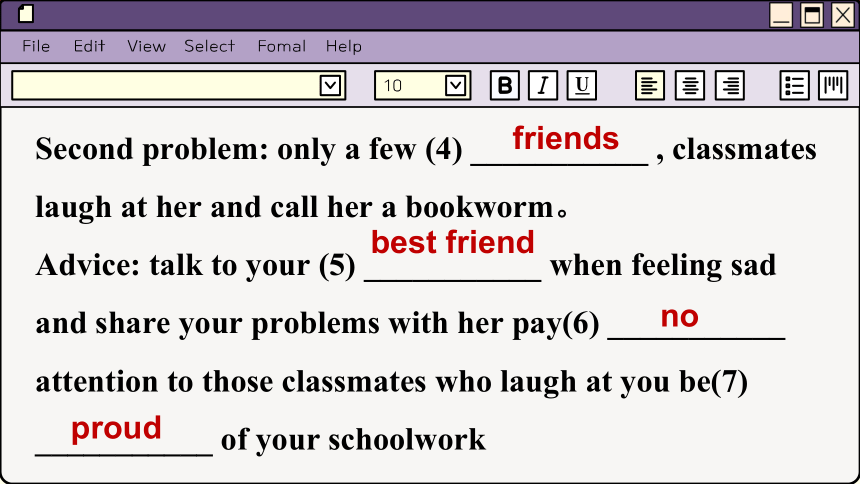
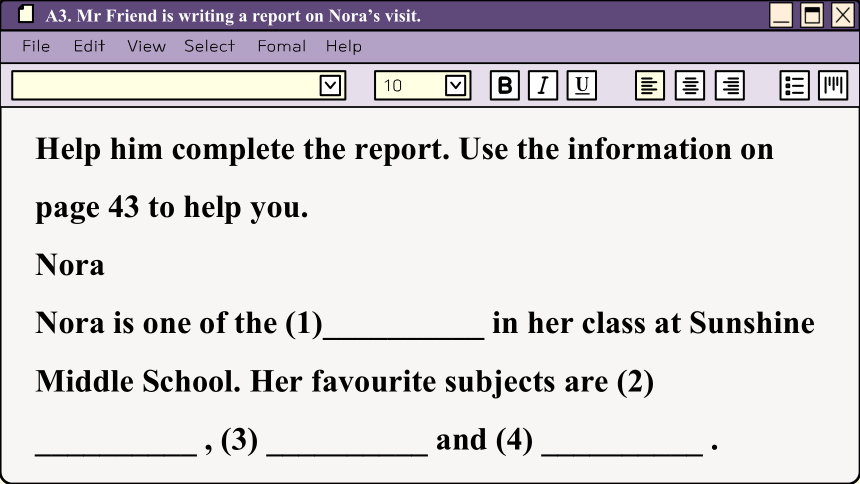
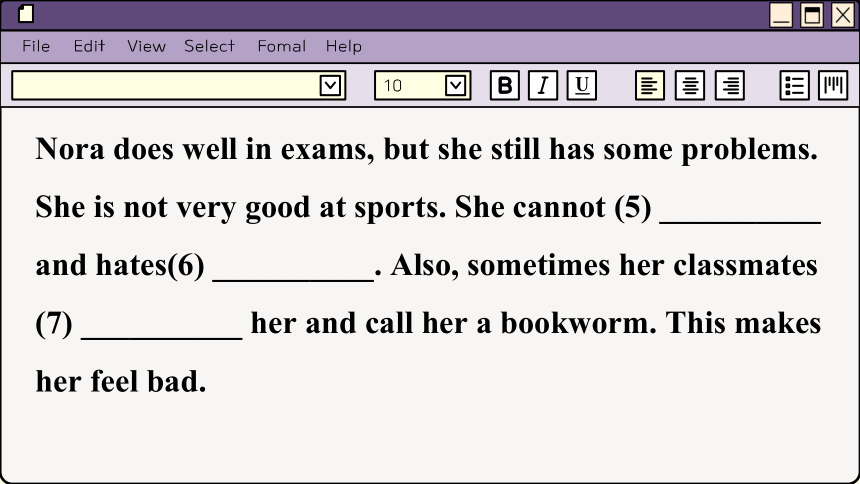
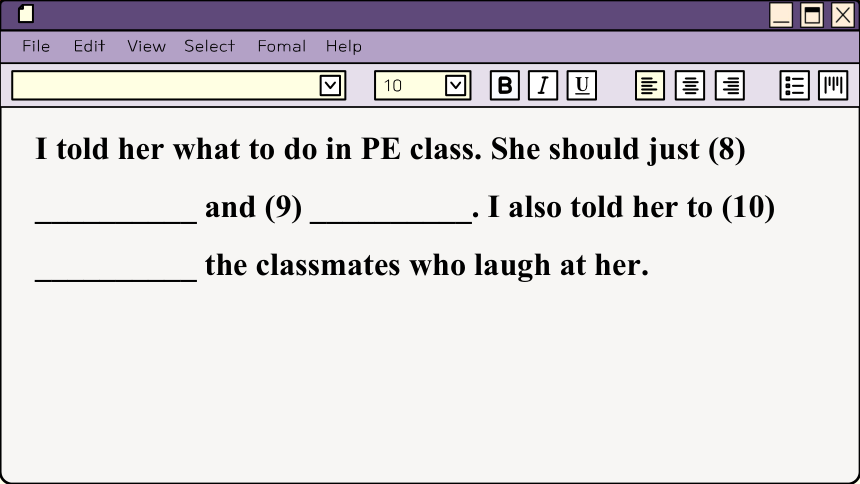
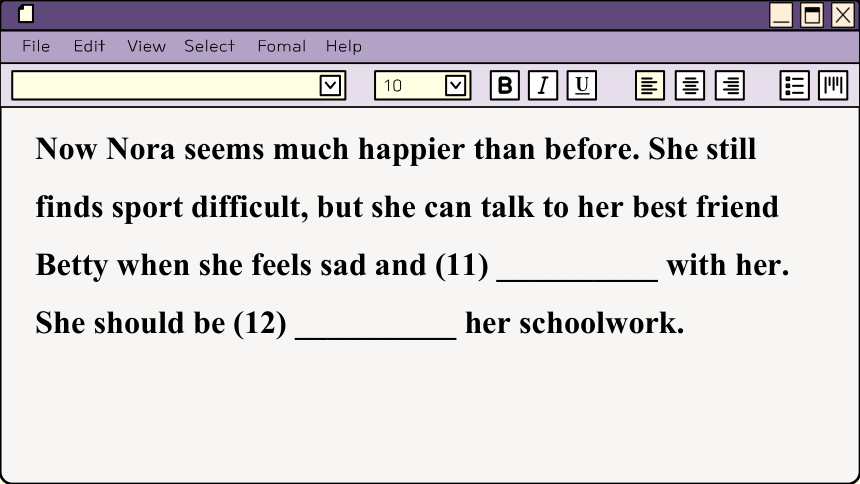
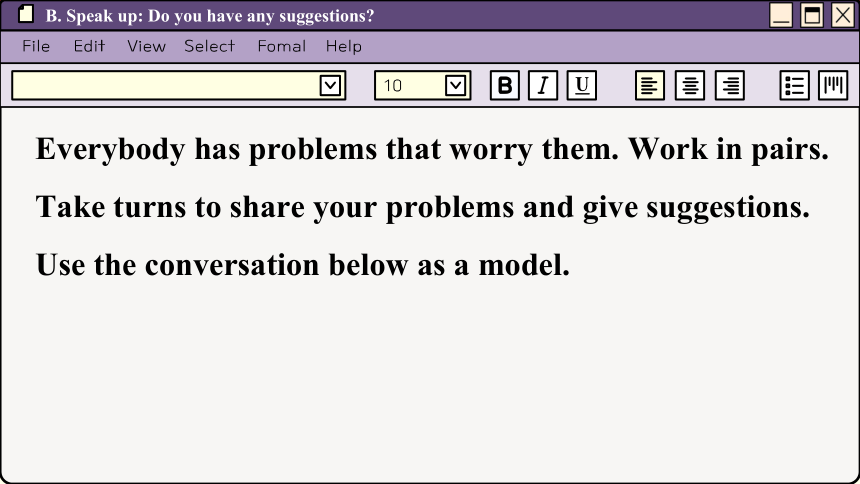
文档简介
(共48张PPT)
Unit 3 Teenage problems
Period 4
Integrated skills & Study skills
课文呈现
A. Dealing with problems A.处理问题
A1. Millie’s classmate Nora also has problems. She went to ask Mr Friend for help. Listen to Nora’s information and put a tick(√) in the correct boxes below.
米莉的同学诺拉也有问题。她去向Friend先生寻求帮助。听Nora的信息,在下面的正确方框中打勾(√)。
Integrated skills综合技能
Nora □
a Grade 9 student □
one of the top students □
loves English, Maths and Chemistry □
always gets high marks in exams □
not very good at sports □
has many friends □
A2. Mr Friend is talking to Nora about her problems. Listen to their conversation and help Mr Friend complete his notes.
Name: Nora
First problem: not good at (1)__________ , cannot(2) ________ and hates swimming
Advice: just try your best in (3) ___________ and enjoy the exercise
sports
run fast
PE class
Second problem: only a few (4) ___________ , classmates laugh at her and call her a bookworm。
Advice: talk to your (5) ___________ when feeling sad and share your problems with her pay(6) ___________ attention to those classmates who laugh at you be(7) ___________ of your schoolwork
friends
best friend
no
proud
Help him complete the report. Use the information on page 43 to help you.
Nora
Nora is one of the (1)__________ in her class at Sunshine Middle School. Her favourite subjects are (2) __________ , (3) __________ and (4) __________ .
A3. Mr Friend is writing a report on Nora’s visit.
Nora does well in exams, but she still has some problems. She is not very good at sports. She cannot (5) __________ and hates(6) __________. Also, sometimes her classmates (7) __________ her and call her a bookworm. This makes her feel bad.
I told her what to do in PE class. She should just (8) __________ and (9) __________. I also told her to (10) __________ the classmates who laugh at her.
Now Nora seems much happier than before. She still finds sport difficult, but she can talk to her best friend Betty when she feels sad and (11) __________ with her. She should be (12) __________ her schoolwork.
Everybody has problems that worry them. Work in pairs. Take turns to share your problems and give suggestions. Use the conversation below as a model.
B. Speak up: Do you have any suggestions
Daniel: I’ve made little progress in my English, Millie. ① I’m very worried.
Millie: Don’t worry, Daniel. It takes time.
Daniel: I see. Do you have any suggestions
Millie: Perhaps you should go over what you’ve learnt as often as possible.
Daniel: That’s a good idea. What else
Millie: How about reading English aloud every morning
Try to pronounce all the words correctly. Learning their correct pronunciation will help you remember them.
Daniel: Thank you, Millie.
Millie: Don’t mention it.
Predicting
To predict is to guess what comes next. It helps us understand what kinds of books or articles we are reading, and where we might find information.
Study skills
When we read an article, we can often predict the content from the title. We can also use the headings in an article to predict the main idea of each part. Headings are the titles of the different parts. Often, they are in bold.
A. There is an article called “The trouble with teenagers”. Predict the points that will be talked about in the article and tick(√) the correct boxes.
A. There is an article called “The trouble with teenagers”.
1. making friends □
2. life in Australia □
3. feeling lonely □
4. schoolwork and hobbies □
5. how our body changes □
6. worrying about tests □
7. study, study, study □
8. love or friendship □
To get a general idea of a book or an article, we should ask some basic questions. If we predict the answers that the questions might have, it will help us find the answers more quickly and easily when we read in detail.
B. Millie is reading an article in Teenagers magazine. Match her questions with your predicted answers. Write the correct letter in each blank.
B. Millie is reading an article in Teenagers magazine.
1. What is it about a. In a new school.
2. When did it happen b. Because she moved to another city.
3. Who is it about c. She is shy and quiet, and she has no new friends
4. Where did it happen d. Problems with the new school.
5. Why did it happen e. A few weeks after the new term.
6. How did it happen f. A girl called Zoe.
d
e
f
a
b
c
考点精讲
考点1
progress 是不可数名词,
因此它不能与a 连用。
中考在线1:
孩子!我想知道是否你这学期已经取得了进步。
My kid! I want to know if you have _________ ________ this term.
【点拨】“取得进步”用短语make progress,由“已经”提示可知,句子用现在完成时态。
made progress
make progress
取得进步
考点2
aloud 是副词,重点在于出声能让人听见,常用在读书或说话上。通常放在实义动词之后。aloud 没有比较级形式。
loud 可作形容词或副词,用作副词时,常与 speak, talk, laugh等动词连用,多用比较级。
loudly 是副词,与loud同义,有时两者可替换使用,但往往含有令人讨厌或打扰别人的意思。
中考在线2:
Reading a______ every morning is a good way to improve your English.[宁波]
【点拨】句意: 每天早上大声朗读是提高你英语水平的一个好方法。read aloud 大声朗读。
考点精讲
返回
loud
课堂练习
一、根据句意及汉语或英语提示完成句子
1. We will do a ____________ (化学) experiment this Friday.
2. He has made great ____________ (进步) in his English studies.
3. We don’t need to ____________ (担心) about the math exam. It is a piece of cake.
chemistry
progress
worry
4. The teacher asked the students to read the text __________ (in a loud voice) after class.
5. You should look up the right __________________(发音) of this word in the dictionary.
aloud
pronunciation
二、 从方框中选择恰当的短语并用其正确的形式填空
go over, pay no attention to, laugh at, be proud of, do well in
6. How can you _____________________ what he says
7. She ____________ her daughter’s ability to speak four languages.
pay no attention to
is proud of
go over,pay no attention to,laugh at,be proud of,do well in
8. He ____________ subjects like history and philosophy.
9. Please do not ____________ me if I can not do it well.
10. ____________ your work carefully before you hand it in.
does well in
laugh at
Go over
三、单项选择
11. —I’m not sure if I copied the address correctly. Can you check it for me ________
—No problem. Let’s check it together.
A. without difficulty
B. without instruction
C. without mistakes
C
【点拨】考查词义理解。correctly 正确地;without difficulty 毫无困难;without instruction 没有指示;without mistakes 没有错误。由上句“我不确定是否正确记下了地址”可知,correctly 意为“正确地”,与选项without mistakes 意义相同。故选C。
12. —Excuse me, can you teach me how to ________ this new word
—No problem. Look at my mouth and listen carefully.
prove B. pronounce
C. prepare D. produce
B
【点拨】考查动词辨析。 句意:—打扰一下,你能教我如何发这个新单词的音吗?—没问题。看我的嘴并且认真听。prove 证明;pronounce 发音;prepare准备;produce 生产。由句意可知选B。
13. —What should I do, doctor
—________ healthy, you should take more exercise.
A. Keep B. Keeping C. To keep
【点拨】本题用语法判定法。考查非谓语动词的用法。
句意:—我该怎么办,医生?—为了保持健康,你应该多做运动。多做运动的目的是为了保持健康,故用动词不定式to keep healthy 作目的状语,故选C。
C
14. —I don’t know ________ next.
—You’d better finish your homework first.
A. what to do B. how to do
C. when to do D. where to do
【点拨】本题用句意理解法。考查“疑问词+ 不定式”结构。根据答语“首先你最好完成你的作业”可知,上一句应该是“我不知道下一步做什么”。故选A。
A
15. — Thank you for taking me around your school, Millie.
—________.
A. Don’t mention it B. Never mind
C. Of course not D. No way
A
【点拨】本题用把握语境法。考查交际用语。
句意:—米莉,谢谢你带我参观你们的学校。
—_________。
Don’t mention it 不客气;Never mind 没关系;Of course not 当然不;No way 没门。这里是对感谢的答复,用“不客气”。故选A。
四、根据所给中文意思,用英语完成下列句子
16. 我认为尽可能经常地说英语是最有用的。
I think it ______________ speak English _________________.
17. 只有几个学生通过了考试,可见考题是很难的。
______________ students passed the exam, ______________ that the paper must have been extremely stiff.
most useful to as often as possible
Only a few so you can see
18. 汤姆并不擅长运动,因此这一次他不大可能会赢。
Tom ____________________ sports, so he is far less likely ______________ this time.
19. 学英文很辛苦,但对你有益。
________________ is hard work, but ______________ you.
is not very good at
to win
Learning English it’s good for
20. 用英语听收音机或读报纸如何呢?
____________________ the radio or reading a newspaper ______________
How about listening to
in English
课堂小结
Unit 3 Teenage problems
Period 4
Integrated skills & Study skills
课文呈现
A. Dealing with problems A.处理问题
A1. Millie’s classmate Nora also has problems. She went to ask Mr Friend for help. Listen to Nora’s information and put a tick(√) in the correct boxes below.
米莉的同学诺拉也有问题。她去向Friend先生寻求帮助。听Nora的信息,在下面的正确方框中打勾(√)。
Integrated skills综合技能
Nora □
a Grade 9 student □
one of the top students □
loves English, Maths and Chemistry □
always gets high marks in exams □
not very good at sports □
has many friends □
A2. Mr Friend is talking to Nora about her problems. Listen to their conversation and help Mr Friend complete his notes.
Name: Nora
First problem: not good at (1)__________ , cannot(2) ________ and hates swimming
Advice: just try your best in (3) ___________ and enjoy the exercise
sports
run fast
PE class
Second problem: only a few (4) ___________ , classmates laugh at her and call her a bookworm。
Advice: talk to your (5) ___________ when feeling sad and share your problems with her pay(6) ___________ attention to those classmates who laugh at you be(7) ___________ of your schoolwork
friends
best friend
no
proud
Help him complete the report. Use the information on page 43 to help you.
Nora
Nora is one of the (1)__________ in her class at Sunshine Middle School. Her favourite subjects are (2) __________ , (3) __________ and (4) __________ .
A3. Mr Friend is writing a report on Nora’s visit.
Nora does well in exams, but she still has some problems. She is not very good at sports. She cannot (5) __________ and hates(6) __________. Also, sometimes her classmates (7) __________ her and call her a bookworm. This makes her feel bad.
I told her what to do in PE class. She should just (8) __________ and (9) __________. I also told her to (10) __________ the classmates who laugh at her.
Now Nora seems much happier than before. She still finds sport difficult, but she can talk to her best friend Betty when she feels sad and (11) __________ with her. She should be (12) __________ her schoolwork.
Everybody has problems that worry them. Work in pairs. Take turns to share your problems and give suggestions. Use the conversation below as a model.
B. Speak up: Do you have any suggestions
Daniel: I’ve made little progress in my English, Millie. ① I’m very worried.
Millie: Don’t worry, Daniel. It takes time.
Daniel: I see. Do you have any suggestions
Millie: Perhaps you should go over what you’ve learnt as often as possible.
Daniel: That’s a good idea. What else
Millie: How about reading English aloud every morning
Try to pronounce all the words correctly. Learning their correct pronunciation will help you remember them.
Daniel: Thank you, Millie.
Millie: Don’t mention it.
Predicting
To predict is to guess what comes next. It helps us understand what kinds of books or articles we are reading, and where we might find information.
Study skills
When we read an article, we can often predict the content from the title. We can also use the headings in an article to predict the main idea of each part. Headings are the titles of the different parts. Often, they are in bold.
A. There is an article called “The trouble with teenagers”. Predict the points that will be talked about in the article and tick(√) the correct boxes.
A. There is an article called “The trouble with teenagers”.
1. making friends □
2. life in Australia □
3. feeling lonely □
4. schoolwork and hobbies □
5. how our body changes □
6. worrying about tests □
7. study, study, study □
8. love or friendship □
To get a general idea of a book or an article, we should ask some basic questions. If we predict the answers that the questions might have, it will help us find the answers more quickly and easily when we read in detail.
B. Millie is reading an article in Teenagers magazine. Match her questions with your predicted answers. Write the correct letter in each blank.
B. Millie is reading an article in Teenagers magazine.
1. What is it about a. In a new school.
2. When did it happen b. Because she moved to another city.
3. Who is it about c. She is shy and quiet, and she has no new friends
4. Where did it happen d. Problems with the new school.
5. Why did it happen e. A few weeks after the new term.
6. How did it happen f. A girl called Zoe.
d
e
f
a
b
c
考点精讲
考点1
progress 是不可数名词,
因此它不能与a 连用。
中考在线1:
孩子!我想知道是否你这学期已经取得了进步。
My kid! I want to know if you have _________ ________ this term.
【点拨】“取得进步”用短语make progress,由“已经”提示可知,句子用现在完成时态。
made progress
make progress
取得进步
考点2
aloud 是副词,重点在于出声能让人听见,常用在读书或说话上。通常放在实义动词之后。aloud 没有比较级形式。
loud 可作形容词或副词,用作副词时,常与 speak, talk, laugh等动词连用,多用比较级。
loudly 是副词,与loud同义,有时两者可替换使用,但往往含有令人讨厌或打扰别人的意思。
中考在线2:
Reading a______ every morning is a good way to improve your English.[宁波]
【点拨】句意: 每天早上大声朗读是提高你英语水平的一个好方法。read aloud 大声朗读。
考点精讲
返回
loud
课堂练习
一、根据句意及汉语或英语提示完成句子
1. We will do a ____________ (化学) experiment this Friday.
2. He has made great ____________ (进步) in his English studies.
3. We don’t need to ____________ (担心) about the math exam. It is a piece of cake.
chemistry
progress
worry
4. The teacher asked the students to read the text __________ (in a loud voice) after class.
5. You should look up the right __________________(发音) of this word in the dictionary.
aloud
pronunciation
二、 从方框中选择恰当的短语并用其正确的形式填空
go over, pay no attention to, laugh at, be proud of, do well in
6. How can you _____________________ what he says
7. She ____________ her daughter’s ability to speak four languages.
pay no attention to
is proud of
go over,pay no attention to,laugh at,be proud of,do well in
8. He ____________ subjects like history and philosophy.
9. Please do not ____________ me if I can not do it well.
10. ____________ your work carefully before you hand it in.
does well in
laugh at
Go over
三、单项选择
11. —I’m not sure if I copied the address correctly. Can you check it for me ________
—No problem. Let’s check it together.
A. without difficulty
B. without instruction
C. without mistakes
C
【点拨】考查词义理解。correctly 正确地;without difficulty 毫无困难;without instruction 没有指示;without mistakes 没有错误。由上句“我不确定是否正确记下了地址”可知,correctly 意为“正确地”,与选项without mistakes 意义相同。故选C。
12. —Excuse me, can you teach me how to ________ this new word
—No problem. Look at my mouth and listen carefully.
prove B. pronounce
C. prepare D. produce
B
【点拨】考查动词辨析。 句意:—打扰一下,你能教我如何发这个新单词的音吗?—没问题。看我的嘴并且认真听。prove 证明;pronounce 发音;prepare准备;produce 生产。由句意可知选B。
13. —What should I do, doctor
—________ healthy, you should take more exercise.
A. Keep B. Keeping C. To keep
【点拨】本题用语法判定法。考查非谓语动词的用法。
句意:—我该怎么办,医生?—为了保持健康,你应该多做运动。多做运动的目的是为了保持健康,故用动词不定式to keep healthy 作目的状语,故选C。
C
14. —I don’t know ________ next.
—You’d better finish your homework first.
A. what to do B. how to do
C. when to do D. where to do
【点拨】本题用句意理解法。考查“疑问词+ 不定式”结构。根据答语“首先你最好完成你的作业”可知,上一句应该是“我不知道下一步做什么”。故选A。
A
15. — Thank you for taking me around your school, Millie.
—________.
A. Don’t mention it B. Never mind
C. Of course not D. No way
A
【点拨】本题用把握语境法。考查交际用语。
句意:—米莉,谢谢你带我参观你们的学校。
—_________。
Don’t mention it 不客气;Never mind 没关系;Of course not 当然不;No way 没门。这里是对感谢的答复,用“不客气”。故选A。
四、根据所给中文意思,用英语完成下列句子
16. 我认为尽可能经常地说英语是最有用的。
I think it ______________ speak English _________________.
17. 只有几个学生通过了考试,可见考题是很难的。
______________ students passed the exam, ______________ that the paper must have been extremely stiff.
most useful to as often as possible
Only a few so you can see
18. 汤姆并不擅长运动,因此这一次他不大可能会赢。
Tom ____________________ sports, so he is far less likely ______________ this time.
19. 学英文很辛苦,但对你有益。
________________ is hard work, but ______________ you.
is not very good at
to win
Learning English it’s good for
20. 用英语听收音机或读报纸如何呢?
____________________ the radio or reading a newspaper ______________
How about listening to
in English
课堂小结
